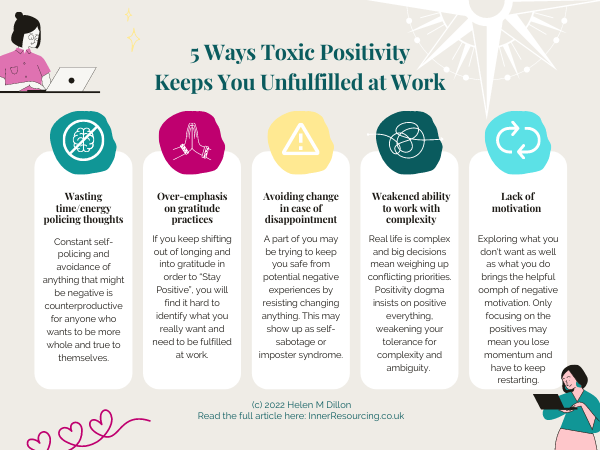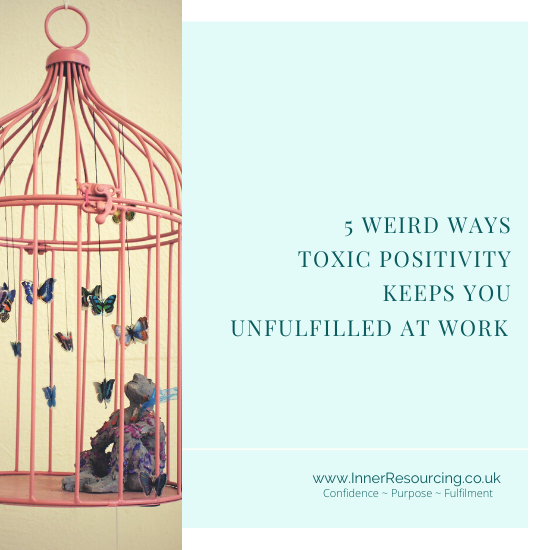5 Weird Ways Toxic Positivity Keeps You Unfulfilled at Work
Is being unfulfilled at work the price you pay for keeping your vibe positive?
Discover 5 ways toxic positivity at work (i.e. over-emphasis on positivity and positive thinking) may be keeping you fed-up and unfulfilled. Then explore 3 antidotes to toxic positivity that every woman needs to know.
Positive energy helps with with resilience and well-being. However, overemphasis on positive thinking may be keeping you caged in a career that you hate, or that you’re bored stiff with.
So what do you need to look out for? How specifically can striving for positivity be distracting and self-limiting?
Knowing what you don’t want is as important as knowing what you do
Constant striving to “think positive” and/or avoid anything “negative” is not only energy sapping but also takes you away from authenticity and being true to yourself. It can hide the truth about where you are stuck.
I’d argue that toxic positivity separates you from your intuitive wisdom about your work.
In my experience the inner wise woman doesn’t often show up dressed nicely and strewing butterflies and rainbows. More often she is a tough talker, intent on getting your attention with strong emotions.
The truth is, if you want to be more fulfilled at work, there are some challenging areas for you to explore.
But before we dig into these, of course, positivity in and of itself is not a bad thing. We all want to feel positive about our lives and careers. So…
When does positivity turn toxic?
It’s not so much positivity itself that is toxic, but the way in which so many people present it as “the only way to be”. When it becomes dogmatic and treated as a panacea, it becomes toxic. When thinking, or saying, or feeling anything even remotely “negative” is outlawed, or vetoed, regardless of the situation, then it is toxic.
Toxic positivity is positive thinking and similar practices, applied in (or prescribed for) every situation. This might look and sound like the blanket adoption of practices such as:
- replacing negative thoughts with positive ones
- encouraging yourself and others to always “look on the bright side” or “stay positive”
- judging yourself when you feel sad, angry, or similar – this self-judgement is what in Inner Relationship Focusing we’d call “the feeling about the feeling” (Ironically, being “judgey” is obviously also “negative” so we need to avoid that too – already tying ourselves in knots with this).
- using gratitude practices as a way of avoiding facing what’s going wrong, or what’s making you unhappy or unfulfilled
- believing that being grateful, cheerful, or “nice”, is more important than being honest with yourself
- minimising by comparing: “at least I’ve got a job”, “I’ve so much going for me compared to what others are going through, I’ve no room to complain.”
What these practices amount to is a rejection of vital parts of yourself and your experience, simply because they’ve been cast as “negative”.

For Fulfilment, Be More You, Not Less
The insistence by coaches, teachers, colleagues, influencers, friends and family, etc. that this “positive thoughts only” approach is the correct way to live is, at best, ill-advised, and at worst, can be extremely harmful. In contrast, many psychologists and self-development experts advocate for a more accepting, compassionate, and balanced approach to our thoughts and feelings.
As your Conscious Career Coach, I’m in the latter group. I believe that in order to be fulfilled at work, or in life, we need to first learn to listen deeply to ourselves and awaken to the profound wisdom that’s to be found within us. We need access to more of our whole selves, not less.
So let’s explore in more detail the specific ways toxic positivity can keep you stuck feeling unfulfilled at work.
5 ways over-emphasis on positive thinking keeps you unfulfilled at work
1. Time and energy spent policing and controlling thoughts keeps you unfulfilled at work
Some people advocate for choosing only positive thinking. “Choose your thoughts”, they’ll trumpet. “Replace negative thoughts with positive ones”.
But only thinking positive thoughts doesn’t come naturally to humans. Like doubting yourself, so called “negative thinking” is just something humans do. (And there are solid evolutionary reasons for it.)
While “replace your negative thoughts with positive ones” might sound good in a fluffy, bliss-scrolling kind of way, in practice it’s actually a recipe for pain and suffering. Because it isn’t natural, the effort to exclusively think positive will mean a lot of time and energy monitoring and evaluating your thoughts. It means constant vigilance.
Then more time and energy changing your thoughts. And consciously turning away from and replacing anything that might be “negative”.
A painfully controlled way of living.
Do you really want to live on red alert?
The fact is, this constant self-policing and avoidance of anything that might be construed as negative is counterproductive for anyone who wants to be more whole and true to themselves. (Which is, frankly, essential for fulfilment). It’s a million miles away from self-compassion and self-acceptance. It creates stress and stifles creativity.
It’s also tiring as hell.
Using up so much energy and time on vigilant inner policing is such a waste. Instead, you could be using it to figure out why you’re unfulfilled at work, and what to do about it.
2. Over-emphasis on gratitude can stop you exploring how much you are unfulfilled at work
So why ARE you unfulfilled at work? How deep and how significant is this sense that something’s missing?
To answer this you need to tune into your inner compass connection. Listen to your inner wisdom. And allow yourself to explore the depths of your longing for fulfilment and for work that has meaning and purpose.
The trouble is, longing can be quite a difficult emotion, because it often has lots of “stuff” attached. Like sorrow, perhaps because you’ve spent your life following a path laid down for you by others and not listening to what’s calling you. Or your inner critic might show up, saying “Why are you even bothering? You’ll never be able to…“.
Longing can be confusing and frustrating.
Many challenging feelings come up when you begin to admit that something’s missing. Or when you allow yourself to experience how much you long for something else.
So what, typically, is the Positive Thinker’s prescription for dealing with difficult times, and uncomfortable feelings? Gratitude.
I’m not asking you to give up your gratitude practice
But I think we need to strike a balance. I don’t want to chuck out gratitude completely, because it is certainly a useful practice.
However, if you keep shifting out of longing and into gratitude in order to “Stay Positive”, you will find it hard to identify what you really want and need to be fulfilled at work.
To become more fulfilled at work, sooner or later you will have to start focusing on what’s missing. To explore what ELSE you might want, and what MORE you might want.

3. Avoiding mistakes and/or possible disappointment keeps you unfulfilled at work
To what extent do you try to avoid feeling disappointed or taking a risk?
Positive thinking as a practice involves avoiding/replacing “negative” thinking and “negative” feelings. But, if you seek a more fulfilling career, and/or more meaningful work, that means change and trying new things. Which might result in mistakes. Or even disappointment.
Your brain is clever. It understands when you tell it that you must, at all costs, stay positive.
A part of you may therefore be trying really hard to protect you from possible “negative” consequences of change, like disappointment or fear. And from negative experiences like your inner critic giving you grief about what you did or didn’t do. (This is especially true if today’s positivity dogma is tapping into childhood “conditions of worth” that are about always being cheerful and not complaining.)
This part may show up as something that looks like self-sabotage, or imposter syndrome. It’s trying to keep you safe from negative feelings by resisting changing anything. Like how unfulfilled you feel in your career.
Of course feeling unfulfilled is itself a potentially “negative” feeling. This might lead you to shift into gratitude (see point 2) or find it hard to stay motivated (see point 5). And therefore you may find it hard to stay with this unfulfilled feeling long enough to do anything about it. It’s all connected.
And when it comes to changing career, over-emphasis on positive thinking can prevent you from objective consideration of downsides, problems, and potential consequences of decisions (or the lack of them).

4. Low tolerance for complexity keeps you unfulfilled at work
Positivity dogma always pushes you to look on the bright side. See the good in everything. This can mean you don’t develop (or you don’t listen to) your instincts for sniffing out potential trouble. Or you don’t pay attention to warning voices inside, instead putting these down to:
- “baggage I need to get rid of”
- “old stuff about e.g. not being good enough”
- “my resistance”
- “general negativity I need to rise above”
But real life isn’t all hearts and flowers and unicorns. It’s complex. There are good things and bad things about most important choices. You will almost always have to make both commitments and sacrifices.
Real boats rock.
Evolving from unfulfilled to fulfilled at work requires careful thought about many different aspects of who you are, what you want and what’s possible. Making good career decisions requires an ability to hold several, possibly conflicting, ideas, needs, and wants in mind at once.
The more you insist on the single dimension of “positive thinking” about everything, the more you weaken your ability to stay with this complexity long enough to allow new understanding to emerge.
5. Lack of negative or “away from” motivation keeps you stuck
Reinventing your career, or even just how you do what you do, is challenging. Do you ever find yourself going round in a loop of wanting to change things, moving into positive thinking, then losing motivation and momentum? It may be that you’re suffering from a lack of the “oomph” you get from negative motivation.
Of course when working towards career fulfilment you will be concerned with issues like: your vision, legacy, your life purpose, and the positive difference you want to make in the world. This “towards” motivation is vitally important.
But, so is the “away from” motivation. Can you allow yourself to plumb the depths of what you don’t want? What you want to stand against? Or does that all feel a bit too negative?
Bear in mind that, often, it can be hard to be clear about exactly what you are going towards. In this case exploring what you don’t want can be a very helpful place to begin.

3 Antidotes to Toxic Positivity’s Stranglehold
1. Focus on Presence not Positivity.
Learn to be with difficult emotions and feelings in order to understand what they are trying to tell you, instead of trying to change them. Your thoughts, feelings, and emotions are neither positive nor negative. They just are. And they carry wisdom about yourself, your relationships, and your situations.
Your job is to listen deeply enough, and with enough self-empathy, to hear what they’re trying tell you.
There are a number of wisdom practices that can help you with this; here at Inner Resourcing I teach self-empathy and how to access your inner compass connection through your wise body. (See here for more information.)
You’ll be astonished at how much more peaceful, energised, and free you feel when you focus on being with and understanding whatever arises within you. Instead of constantly trying to change it into what someone somewhere has decreed is “positive”.
And do check out this helpful guide on working with the Inner Critic, which introduces some of these concepts in more detail, and includes a step by step process for disarming your inner critic (pdf, no sign-up required):
2. Balanced thinking
Habitually critical, despondent, pessimistic, or gloomy thinking can lead you into a spiral of difficult feelings.
It can therefore be hard to take pleasure from anything, never mind take action. So, of course, it’s important to find a way of introducing positivity, and have uplifting and upbeat experiences.
However, as discussed above, over-emphasis on positive thinking can be unrealistic, produce unworkable solutions, and lead you to avoid what feels dark or difficult. It can bypass the self-knowledge that can come from adversity. Not to mention the self-care you need to grow from hard times.
When it comes to changing being unfulfilled at work, balanced thinking will get you further than either pole of positive thinking, or negative thinking.
By allowing yourself to focus on the negatives about your current situation, as well as the positives, you’re not only getting the full picture in all its complexity. You can also tap into the powerful drive of “away from” motivation.
Having balance as an intention means you are open to complexity and therefore can be more creative in designing your career transition.
3. Live wild. Don’t let them tame you
There is something about the current vogue for positive thinking above all else that smacks of trying to tame us.
Make us nice.
Well-behaved. Uncomplaining. Grateful we’ve received anything.
I’m reminded of that dismally preachy instruction: “If you can’t say anything nice, don’t say anything at all.“
On the contrary, it is absolutely right and necessary at times to say:
“This isn’t enough for me.“
“This situation sucks.”
“No more. I am DONE with this.”
Being clear about exactly what it is that we don’t like, don’t want, don’t appreciate, and will no longer stand for is essential for fulfilment, in work and out.
It’s good to cry. It’s empowering to rail and complain and express our anger in appropriate ways.
It is vital that we face our shadow, hear our so-called negative thoughts, and embrace the parts of us that are unloved, that seem monstrous, untamed, and unshriven.
Otherwise we will end up nice, tidy, well-behaved, and unfulfilled women living nice, tidy, well-behaved, tame, and, yes, boring and unfulfilled lives.
Next Steps
If you found this article useful, here are some suggestions as to what to do next:
- Journaling is a great way of listening deeply to and being present with yourself. Check out this list of 23 writing prompts for journaling about your career
- Want to explore more ways of doing balanced thinking about fulfilment at work? This article about the 4 shifts for more fulfilment at work without changing career has some useful self-reflection questions and prompts.
- Ready to talk, and get support for the more challenging aspects of career change? Check out ways of working with me here… or get in touch for an informal chat about your next big career adventure.
- Share this article with others you think might find it useful (share buttons below)
